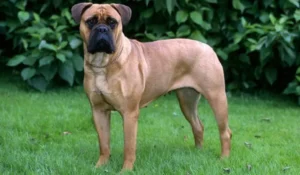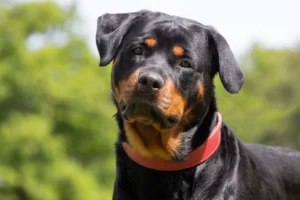Dogs are known as “man’s best friend” because of their devotion, companionship, and protective instincts. Humans have used dogs for a variety of purposes throughout history, including protecting their homes and properties. While all dogs are protective in some way, certain breeds are known for their exceptional protective instincts.
Introduction
In this detailed article, we will look at some of the most loyal and protective dog breeds. We’ll look at their background, qualities, and what makes them such good guardians.
An Overview of Protective Dog Breeds
Protective dog breeds have a strong need to protect their territory, families, and belongings. These breeds are renowned for their alertness, bravery, and unwavering loyalty. Because their protective nature is deeply ingrained in their genetic makeup, they frequently make excellent watchdogs and guard dogs. While all dogs have the ability to be protective, certain breeds stand out for their exceptional abilities in this regard.
- What Characteristics Distinguish a Protective Dog?

Several crucial qualities and activities distinguish the best guard dogs for families:
Vigilance: Protective dogs are extremely vigilant. They have heightened alertness and are fast to spot any hazards or intruders.
Loyalty: These dogs are devoted to their owners. They will go to great lengths to protect and defend those they care about.
Bravery: Protective dogs are fearless in the face of danger. They will not back down when confronted with a threat.
Territorial Instinct: They have a strong territorial instinct and will fiercely defend their home and property.
Trainability: Many protective dog breeds for families are intelligent and trainable, which allows them to learn specific commands and receive protection training.
Physical Strength: Some of the best guard dogs for families are large and strong, making them intimidating to would-be intruders.
Popular Dog Breeds for Protection
Let us look at some of the most protective dog breeds. Each of these breeds has a unique history, temperament, and set of attributes that make them exceptional protectors.
- German Shepherd

The German Shepherd is perhaps one of the most loyal and protective dog breeds. Originating from Germany, these dogs are noted for their intelligence, loyalty, and courage. They have a strong work ethic and excel in different jobs, including as police dogs, search and rescue dogs, and family protectors.
History: German Shepherds were originally bred in the late 19th century for herding and protecting livestock. Their protective character was vital in shielding sheep from predators. Over the years, their exceptional protective instincts have made them perfect for many job roles, especially as the best guard dogs for families.
- Characteristics
Intelligence: German Shepherds are highly intelligent and easily trainable. They can learn a wide range of orders, making them good candidates for protection training.
Loyalty: They create strong ties with their owners and are highly loyal, making them protective of their family.
Courage: German Shepherds are recognized for their courage and will courageously approach threats.
Strength: They are a powerful and nimble breed, capable of strenuous chores and intimidating possible invaders.
Alertness: Their alert demeanor and acute senses make them excellent protective dog breeds for families.
- Rottweiler

Rottweilers are big, strong dogs with an inherent protective instinct. They are well-known for their powerful physiques and steadfast devotion to their families. Rottweilers, which were originally bred as working dogs in Germany, have grown popular as both protectors and family pets.
History: Rottweilers have a rich history that dates back to ancient Rome. They were used to herd and protect livestock, and their ancestors are descended from these working dogs.
- Characteristics
Muscular Build: Rottweilers have a powerful physical presence that can be threatening to potential intruders.
Loyalty: They are fiercely loyal to their owners and are known to build deep ties with them.
Territorial: Rottweilers have a strong sense of territoriality and will defend their home and family.
Intelligence: Because of their intelligence, they are easily trained and responsive to directions.
Protective Instinct: Rottweilers have a natural protective instinct and will defend their loved ones.
- Doberman Pinscher

Doberman Pinschers, also known as Dobermans, are well-known for their protective nature and sleek appearance. They range in size from medium to large and have a strong, muscular build. Doberman pinschers are well-known for their intelligence and agility, which makes them excellent guard dogs and positions them among the best guard dogs for families.
History: A tax collector by the name of Louis Dobermann was the first to breed Doberman pinschers in Germany. They needed a trustworthy and protective companion to accompany them on their tax-collection rounds. These characteristics were selectively bred into the breed.
- Characteristics
Intelligence: Dobermans are extremely intelligent dogs who can learn complex commands and protection training.
Loyalty: They have close relationships with their families and are fiercely loyal to them.
Bravery: Doberman pinschers are known for their bravery and will not back down from a challenge.
Vigilance: They are alert and make excellent choices among the best guard dogs for families.
Elegance: Dobermans are known for their sleek and elegant appearance in addition to their protective nature.
- Bullmastiff

The Bullmastiff is a massive and powerful breed known for its gentle nature and protective instincts. Despite their size, they are often referred to as “gentle giants.” They were originally bred in England to guard estates from poachers.
History: Bullmastiffs were developed in the 19th century by crossing Bulldogs and Mastiffs. The result was a breed with the strength and courage to take on intruders while maintaining a calm and gentle demeanor with their families.
- Characteristics
Size and Strength: Bullmastiffs are large and robust, making them physically imposing.
Gentleness: Despite their protective nature, they are gentle with their families, especially with children. They are highly renowned among the protective dog breeds for families.
Loyalty: They are loyal and devoted to their owners.
Courage: Bullmastiffs are brave and will protect their territory.
Protective Instinct: Their protective instinct is well-developed, which makes them one of the best family protection dogs.
- Belgian Malinois

The Belgian Malinois is a highly intelligent and agile breed that excels in protection work. They are often mistaken for German Shepherds due to their similar appearance and working abilities. These dogs have been used in various law enforcement roles, including as police and military dogs.
History: Belgian Malinois were developed in Belgium for herding and guarding livestock. They have a long history of working closely with humans.
- Characteristics
Intelligence: Belgian Malinois are exceptionally intelligent and quick learners, making them ideal for protection training.
Loyalty: They form strong bonds with their handlers and are fiercely loyal.
Courage: These dogs are incredibly brave and will confront threats without hesitation.
Energy: Belgian Malinois are high-energy dogs, which makes them well-suited for active protection work.
Alertness: They are highly alert and have keen senses, making them excellent watchdogs.
Note: There might be affiliate links mentioned here. We may receive a commission if you purchase a product through an affiliate link. There is no additional charge for you. Please do your own research before making any online purchases.
- Boxer

Boxers are medium-sized dogs with a playful and friendly demeanor, but they also possess strong protective instincts. They are known for their athleticism and loyalty to their families.
History: Boxers were originally bred in Germany and were used for hunting and as working dogs. They were often used in roles that required protection and guarding.
- Characteristics
Playfulness: Boxers have a playful and affectionate nature, making them excellent choice as among the most sought after protective dog breeds for families.
Loyalty: They form strong bonds with their families and are protective of them.
Courage: Boxers are courageous and will not hesitate to protect their loved ones.
Strength: They are physically strong and can be intimidating to potential threats.
Alertness: Boxers are alert and make effective watchdogs.
- Akita

The Akita is a large and dignified breed known for its loyalty and protective nature. They originated in Japan and were originally bred for hunting and guarding.
History: Akitas have a long history in Japan, where they were used for guarding and hunting large game. They were also considered symbols of good luck and protection.
- Characteristics
Loyalty: Akitas are intensely loyal and devoted to their families.
Courage: They are brave and protective, especially when it comes to their loved ones.
Dignity: Akitas have a dignified and regal appearance, which can be intimidating to intruders.
Independence: They are known for their independent nature, which adds to their protective instincts.
Alertness: Akitas are watchful and make excellent watchdogs.
- Tibetan Mastiff

The Tibetan Mastiff is a large and imposing breed with a history of guarding livestock in the Himalayas. These dogs are known for their independence and protective instincts.
History: Tibetan Mastiffs have been guarding Himalayan villages and monasteries for centuries. Their thick fur helps them endure harsh weather conditions.
- Characteristics
Independence: Tibetan Mastiffs are known for their independent nature, which contributes to their protective instincts.
Loyalty: They have close relationships with their families and are fiercely loyal to them.
Courage: These dogs are brave and will protect their territory and loved ones.
Strength: Tibetan Mastiffs are physically strong and have a powerful presence.
Protective Instinct: Their protective nature is deeply ingrained and makes them excellent guard dogs.
- Rhodesian Ridgeback

The Rhodesian Ridgeback, often called the “African Lion Hound,” is a breed with a strong protective nature and distinctive “ridge” of hair along its back. They originated in southern Africa and were used for hunting and protection.
History: Rhodesian Ridgebacks were developed in southern Africa by crossing European and native African breeds. They were used to hunt large game and protect their owners.
- Characteristics
Loyalty: Rhodesian Ridgebacks are loyal to their families and protective of them.
Courage: They are courageous and will confront threats with determination.
Speed: These dogs are known for their speed and agility, which can be useful in protection work.
Alertness: They are highly alert and make excellent watchdogs.
Distinctive Ridge: The “ridge” of hair along their back is a defining characteristic of the breed.
- Caucasian Shepherd Dog

The Caucasian Shepherd Dog, also known as the Caucasian Ovcharka, is a huge and powerful breed with a strong protective instinct. They originated in the Caucasus region and were used to protect livestock from predators.
History: Caucasian Shepherd Dogs have a long history of guarding livestock in challenging mountainous terrain. They are known for their bravery and tenacity.
- Characteristics
Size and Strength: These dogs are among the largest and strongest in the world, which can be intimidating to intruders.
Courage: They are incredibly brave and will not back down from a threat, making them one of the best family protection dogs.
Loyalty: As one of the most protective dog breeds for families, Caucasian Shepherd Dogs are fiercely loyal to their families and will protect them at all costs.
Independence: They have an independent nature, which adds to their protective instincts.
Protective Instinct: Their protective nature is deeply ingrained and makes them excellent guard dogs.
Choosing the Right Protective Dog Breed

When considering a protective dog breed, it’s important to remember that training and socialization play a significant role in their behavior. A well-trained and socialized dog is more likely to be a loving and protective family pet than a potential liability.
Here are some key factors to consider when choosing a protective dog breed:
- Temperament
While all the breeds listed are known for their protective nature, it’s crucial to consider the specific temperament of the dog. Each individual dog will have its own personality, so meeting the puppy’s parents and observing their behavior can provide insight into the puppy’s potential temperament.
- Training
Proper training is essential for any protective breed to ensure they respond to commands and behave appropriately in various situations. Positive reinforcement-based training is often the most effective approach.
- Socialization
Early and ongoing socialization is vital to ensure that the best family protection dogs are comfortable around people, other dogs, and different environments. This helps prevent aggressive behavior and fear-based reactions.
- Exercise
Many protective breeds are high-energy dogs and require regular exercise to stay physically and mentally healthy. Failing to provide enough exercise can lead to behavioral problems.
- Commitment and Time
Owning a protective breed requires time and commitment. These dogs need attention, exercise, and socialization, so be prepared for the responsibility.
FAQs
What defines a protective dog breed?
Protective dog breeds are characterized by their alertness, loyalty, courage, territorial instinct, trainability, and often, physical strength. These traits make them natural guardians of their families and property.
Can all dogs be protective to some extent?
Yes, to varying degrees, all dogs have the potential to be protective. However, some of the most loyal and protective dog breeds are reputed to have these protective instincts profoundly established in their genetic makeup.
Do protective dog breeds make good family pets?
Yes, many protective dog breeds make the best family protection dogs. They are known for their loyalty and affection toward their families. However, proper training and socialization are essential to ensure they are well-behaved and safe around people and other animals.
What are some common training needs for protective dog breeds?
Protective dog breeds require specific training to channel their protective instincts effectively. Training should include commands for protection, obedience, and socialization to ensure they interact well with strangers and other pets.
Are protective breeds more aggressive than other dogs?
Protective breeds are not necessarily more aggressive, but their protective instincts may lead to aggressive behavior if not properly trained and socialized. They can be protective without being overly aggressive with the right guidance.
Is there anything special to consider when getting a protective dog breed?
Yes, protective breeds require time, commitment, and regular exercise. They should be well-trained and socialized to ensure their protective nature is balanced with good behavior.
What’s the best way to socialize a protective dog breed?
Socialization should begin at a young age and expose the dog to various people, animals, environments, and situations. Positive interactions and reinforcement during socialization are essential for the best family protection dogs.
Can protective dog breeds be kept in apartments or small living spaces?
Some protective breeds may adapt to apartment living if provided with sufficient exercise and mental stimulation. However, most of these breeds thrive in larger spaces with room to move.
Do protective dog breeds get along with children and other pets?
Many protective breeds are known for their affection and gentleness with children and other pets within their family. Proper socialization and supervision are crucial to ensuring safety.
Which protective dog breed is best for a first-time dog owner?
While some protective types can be ideal for first-time owners, it’s necessary to examine the breed’s energy level, temperament, and exercise needs. Breeds like Boxers, Rottweilers, or German Shepherds may be more manageable for new owners with the correct coaching. However, professional advice and training are recommended for first-time owners of protective breeds.
Conclusion
Protective dog breeds can be wonderful companions for families and individuals seeking both love and security. However, it’s crucial to note that with the correct training, socialization, and care, these breeds can be affectionate and loyal family pets while still serving their protective functions well. If you’re considering adopting one of the best family protection dogs, make sure you are prepared to commit the time and effort required to develop a well-rounded and protective canine partner.








